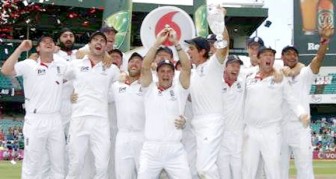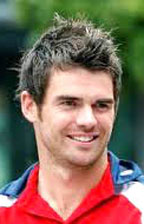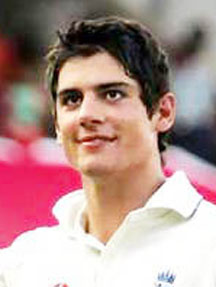LONDON, (Reuters) – Meticulous preparation, thorough professionalism and unprecedented fitness levels underpinned England’s 3-1 Ashes triumph in Australia.
They possessed the best batsman in Alastair Cook, the most successful bowler in James Anderson and a management team of head coach Andy Flower and captain Andrew Strauss who scarcely put a foot wrong.

England outplayed a team who have dominated world cricket for the past 15 years in all departments of the game.
Strauss joins Len Hutton as the only English captains to win an Ashes series home and away against a full-strength Australian side in a five-match series.
Five months ago Cook was playing for his test place. Now the former choirboy with the streak of steel and insatiable hunger for runs occupies a place in the record books alongside the giants of the game.
He scored 235 not out in Brisbane to save a match Australia had dominated, 148 in Adelaide to set up an England victory, and 189 in Sydney to extinguish the home side’s last faint hopes of levelling the series.
Cook batted more than 36 hours, longer than anybody in a five-match series, and his Ashes series aggregate of 766 is second only to the great Wally Hammond’s 905 in 1928-29.
Still only 26, Cook could break every test scoring record in the English game.
LEADER OF
THE PACK
England’s commitment to a four-man attack in the absence of an all-rounder of sufficient test class since Andrew Flintoff’s injury-enforced retirement placed James Anderson squarely under the spotlight.
Anderson graduated to the role of senior England pace bowler with his ability to bend the ball late both ways at a lively pace. Doubts, though, remained over his temperament and ability to find an alternative strategy if the ball was not swinging.

The unassuming Lancastrian delivered with 24 wickets, including some brilliant spells in which the batsmen were not good enough to get an edge.
When the ball stopped swinging he adjusted his length, and his accuracy was such that the batsmen were never able to wrest control. He also looked the part of a strike bowler.
“Body language is a huge thing,” Anderson said. “I try to keep my shoulders back now and to be positive. In the past I’ve been pretty average at that.”
HARD WORK
Flower identified Jonathan Trott’s contribution in the innings win in Melbourne as an example of the improvements made in England’s conditioning and fielding.
Trott had made 46 when he dived full length to avoid a runout. He went on to score 168 and was still alert enough to run out Phil Hughes when Australia batted.
“Those on the inside know that Trott has worked incredibly hard at his fitness and fielding this past year and, when it comes together, that is an example of something that makes me proud as a coach,” said Flower.

Flower inherited his job in the most unpromising of circumstances after former head coach Peter Moores and captain Kevin Pietersen were sacked before the tour of West Indies early in 2009.
He took from over from Moores while Strauss replaced Pietersen and the pair quickly established a close rapport after an awful start when England were dismissed for 51 in the first test.
England lost that series but with Strauss leading from the front as opening batsman and leader they won the Ashes back in the same year.
Flower had shown his skill as a player when he was briefly the world number one batsman while playing for lowly Zimbabwe, and his character as a man when he protested against Robert Mugabe’s regime at the 2003 World Cup.
Now he has proven an equally effective coach.
“He looks at every aspect of the team’s performance, at what things we could do to make it two percent better,” said batting coach Graham Gooch.
NO GENTLE GIANT
Stuart Broad’s premature exit through injury gave Chris Tremlett the chance to show he was more than a gentle giant and he grabbed his chance in Perth, bowling with bounce and aggression.
He will now be hard to dislodge as Anderson’s new ball partner.
Similarly, Tim Bresnan fully vindicated his selection in Melbourne ahead of Steven Finn, who had taken the most wickets for England in the first three tests but who had also leaked runs and was showing signs of strain on his still maturing body.
Their success meant the world’s number one spinner Graeme Swann did not need to play as influential a role as expected, although he still managed a five-wicket haul in the second innings in Adelaide.
Duncan Fletcher, coach of the England side who defeated Australia in the unforgettable 2005 series, said the current England bowling unit was as good as his.
“The performances of Chris Tremlett and Tim Bresnan show it has more depth,” he added.
Unlike the 2005 side who possibly celebrated too long and too hard, Strauss’s men will remain grounded with a World Cup imminent.
Flower said the team who regained the Ashes in 2009 after the 5-0 humiliation in Australia two years earlier had been encouraged to keep their feet on the ground.
“I think they have done so,” he said. “I definitely think we have what it takes to get to the top. England have not been number one before. We want to get there and we are heading in the right direction.”




